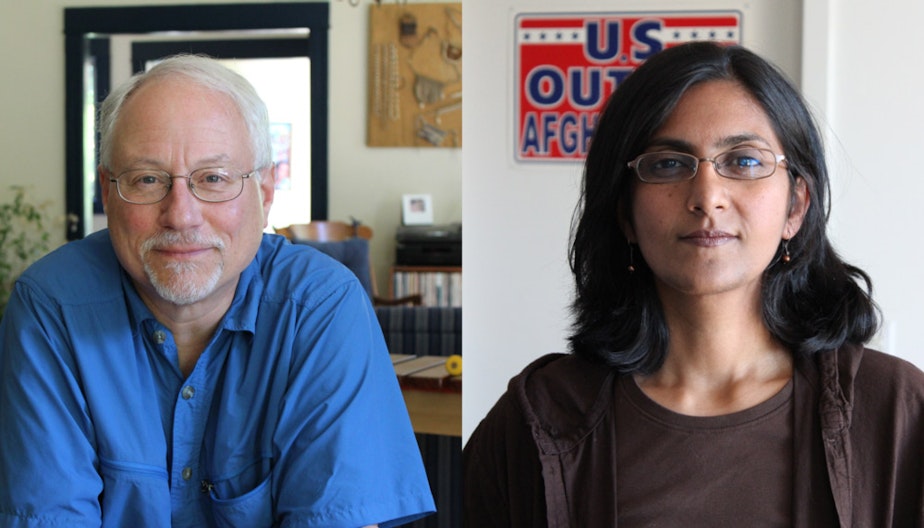Socialist Candidate Sawant Keeps Conlin On Defensive

In coming weeks, Seattle City Councilmember Richard Conlin will be working hard to secure votes, as he faces a serious challenger: Socialist Kshama Sawant, a Mumbai-educated economics professor who has focused on the $15 minimum wage, which Conlin doesn’t support.
“Our city is actually well to the left of opinions and policy making that you see in city government and the city council is out of touch with local opinion,” Sawant, 40, said at a candidate’s forum earlier this month.
Conlin, running for his fifth term, hasn’t stood by workers and communities, she has repeated at her events. And when she talks, usually at candidate forums, eager supporters applaud her every talking point.
Born in India, Sawant has said she moved to Seattle for personal reasons but found the city interesting and open-minded. She has been a union activist and a member of the Occupy movement and has mobilized against budget cuts in Olympia.
Her husband is an engineer at Microsoft, according to a personal filing with the Public Disclosure Commission.
Sponsored
Sawant isn’t new to campaigning. She ran against House Speaker Frank Chopp in 2012, winning 29 percent of the vote, more than double previous challengers. In the city council primary, she won 35 percent of the vote.
At the forum earlier this month, Conlin, 64, replied to Sawant’s talking points by listing awards and endorsements he has accumulated during his 16-year tenure on the council: He has been endorsed by the King County Labor Council, won Hunger Fighter of the Year, been named Social Justice Visionary, and so on.
Sawant stuck to her main message: the minimum wage, which became a hot-button issue this summer as fast food workers protested across the country, demanding better pay.
“In order to fight for something like the $15 an hour minimum wage, you need to stand boldly against corporate interests and say I don’t care what they think, I’m fighting for working people and low income people,” she said.
Conlin said the issue is more complicated than that: “You can’t necessarily assume that by passing a regulation, everything is going to change.”
Sponsored
Sawant, a member of the Socialist Alternative party, uses academic language to address the issue of homelessness: The roots of homelessness are within the roots of our capitalist society itself, she said at a candidate forum.
Tent cities and tent encampments are a really necessary Stop gap measure to help homeless people, she said. “Mr. Conlin voted to end Nicklesville and he voted against a measure that would allow the city to ease its regulation.”
Conlin sounded defensive as he explained his position, saying that the council had been advised by the federal government’s homelessness initiative.
“Places that wind up focusing on camps don’t put their resources into the things that really need to be changed – to providing people with low-income housing, with real housing opportunities and options,” he said.
Toward the end of the forum, Conlin countered Sawant’s premise, arguing that Seattle’s problem have more to do with success.
Sponsored
“One of the things we’re suffering from is that Seattle is so successful,” he said. “We have one of the lowest unemployment rates in the country. People are flocking here, they want to be here.”
In the audience, watching the debate, Jodi Grage said she had known Conlin for decades and were both part of the group that started Sustainable Seattle years back.
“I think that any group that has the same people over and over it inherently becomes narrower. We need more than two parties; we need more opportunities,” Grage said.
Asked if she would vote for Sawant, Grage paused.
“Well,” she said, hesitating, “yes.”
Sponsored
Ballots begin arriving in mailboxes next week.

